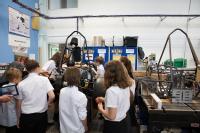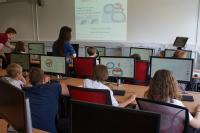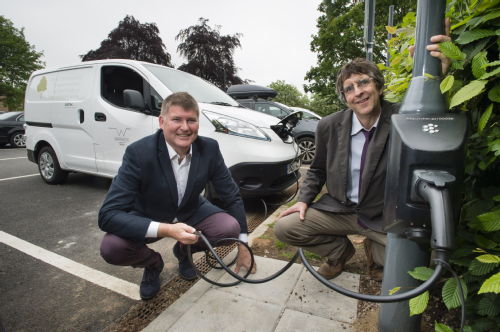WMG News
Professor Lord Bhattacharyya receives honorary degree
 Professor Lord Bhattacharyya received an honorary degree for his contribution to science and engineering, from the University of Science and Technology Beijing (USTB) on Friday (29 June 2018). The degree was conferred by the University of Science and Technology Beijing, and the conferment was approved by the Academic Degrees Committee of the State Council of China.
Professor Lord Bhattacharyya received an honorary degree for his contribution to science and engineering, from the University of Science and Technology Beijing (USTB) on Friday (29 June 2018). The degree was conferred by the University of Science and Technology Beijing, and the conferment was approved by the Academic Degrees Committee of the State Council of China.
China has been very interested in how Professor Lord Bhattacharyya has created effective innovative approaches to science and technology, over the past 40 years, and the huge successes that WMG has had nationally and internationally.
Professor Lord Bhattacharyya, Chairman and Founder of WMG, said: “I am delighted to be awarded an honorary degree for my contribution to science and engineering, and honoured to receive this from such a prestigious university.”
Dr Kogila Balakrishnan launches Technology Offsets in International Defence Procurement
 Dr Kogila Balakrishnan, WMG’s Director of Client and Business Development, has written a new book entitled Technology Offsets in International Defence Procurement.
Dr Kogila Balakrishnan, WMG’s Director of Client and Business Development, has written a new book entitled Technology Offsets in International Defence Procurement.
This is the first book to focus on both the theory and practice of offsets, combining developmental economic theories, technology theories, business and management theories and international business practice.
The book addresses issues of technology, industrial development, international business and economic development but also provides readers with wider learning opportunities.
Featuring a foreword from Professor Lord Bhattacharyya, Chairman of WMG, the book has been designed for those studying international procurement, international trade, international business, defence policy and industrial policy. It will also be of interest to practitioners and policy makers in both government and industry.
Dr Balakrishnan is responsible for international business development, research in defence management and offsets as well as teaching at WMG. Her specific role is to develop and enhance education and research collaboration focused in Malaysia and South East Asia.
Pre-order your copy here. The book is on general release from 13th September 2018.
New report says UK electric vehicle battery industry could be worth £2.7 billion per year for UK chemical companies
 A new report published today Monday 25th June 2018 shows that UK companies are well-placed to supply valuable materials needed for batteries to be built in UK – a potential £2.7 billion per year business opportunity. The report commissioned by WMG at the University of Warwick, was launched to the Chemical Industry Association at the Chemistry Growth Partnership meeting in London, chaired by Steve Foots, Chief Executive of Croda, and attended by Richard Harrington MP.
A new report published today Monday 25th June 2018 shows that UK companies are well-placed to supply valuable materials needed for batteries to be built in UK – a potential £2.7 billion per year business opportunity. The report commissioned by WMG at the University of Warwick, was launched to the Chemical Industry Association at the Chemistry Growth Partnership meeting in London, chaired by Steve Foots, Chief Executive of Croda, and attended by Richard Harrington MP.
The research underpinning the report brought together experts and data from the automotive battery industry and chemicals industry, working in the context of the UK’s Industrial Strategy, points to a large UK battery manufacturing industry opportunity. The report was funded by EPSRC, commissioned and managed by WMG at the University of Warwick acting in their role as the Advanced Propulsion Centre Electrical Energy Storage Spoke, and delivered in partnership with E4tech. WMG’s Professor David Greenwood, one of the report’s authors said:
“This report details a massive opportunity to grow a UK battery chemicals industry and related supply chain. The UK’s Industrial Strategy identified battery development and manufacture as one of the four initial Grand Challenges to coalesce industrial activity upon high growth opportunities. Battery pack manufacturing for electric vehicles (EVs) will logically take place close to the point of vehicle assembly since packs are hard to transport. This in turn implies that the battery cells which make up the packs will best be manufactured in (or close to) the UK. This could also mitigate the loss of vehicle engine production.”
“However for cell production to occur in the UK, the supply chains of chemicals would need to be reconfigured, since most cell production and chemicals supply is currently in Asia. Whilst such components could be imported, to capture the most value cell production and the related chemical and process equipment supply would need to come from UK suppliers.”
Using e-health to support the challenges of an ageing population
Researchers at our Institute of Digital Healthcare have published a systematic review on e-health based active ageing interventions.
As life expectancy is at an all-time high, this type of research has become an international priority offering enormous potential to support individuals, communities, clinicians and policy makers.
Our Professor of e-Health Innovation and Head of Research, Theo Arvanitis, Dr Timothy Robbins and Dr Sarah Lim Choi Keung, worked alongside experts at University Hospitals Coventry and Warwickshire to establish the extent to which current research literature considers e-health-based and telemedicine-based active ageing interventions.
Budding young engineers visit WMG
Yesterday we, along with our colleagues from the Advanced Propulsion Centre (APC) welcomed a group of 9 to 11 year olds from Richard Crosse Primary School in Staffordshire.
 The students enjoyed a tour of the APC showcase and our engineering hall where they were introduced to the Warwick Racing student team and shown our state-of-the-art 3xD Simulator. They also took part in a number of activities throughout the day, including a steering wheel CAD design session and paper rocket making and launching.
The students enjoyed a tour of the APC showcase and our engineering hall where they were introduced to the Warwick Racing student team and shown our state-of-the-art 3xD Simulator. They also took part in a number of activities throughout the day, including a steering wheel CAD design session and paper rocket making and launching.
We first met the children, from class five, back in January when they won a competition run by the APC to become one of eight schools presented with a Greenpower Goblin kit car. Each winning school was then partnered with an APC Spoke, in this case WMG as the APC Energy Spoke, who provide financial support and mentoring throughout the electric vehicle build along with driver training ahead of the race.
schools presented with a Greenpower Goblin kit car. Each winning school was then partnered with an APC Spoke, in this case WMG as the APC Energy Spoke, who provide financial support and mentoring throughout the electric vehicle build along with driver training ahead of the race.
Construction of their go-kart kit car is now almost complete. The next stage of the project is for the children to race against other teams at Rockingham Speedway in July. We’ll keep you updated on how their race day goes.
Formula Goblin has been set up with help from the Greenpower Education Trust to address the skills gap that is growing in the UK automotive industry by engaging students in engineering at a young age. It is designed to engage students with maths, science and design technology in a fun way, promoting equality regardless of economic background and gender.
The initiative is supported by the Engineering and Physical Science Research Council, the APC and the APC Spoke Community, made up of six of the UK’s leading universities each focussing on R&D of key technology areas in the automotive industry.
Notes to editors:
The APC is a £1 billion, 10-year programme to position the UK as a global centre of excellence for low carbon powertrain development and production.
The APC Spokes form a national network to support industry with specialist academic, technological and commercial expertise. The Spokes are designed to provide access to the best expertise and facilities the UK has to offer in key strategic technologies for the automotive industry.
Each of the Spokes is hosted by an organisation with recognised expertise in those key technologies, but the fundamental role of the Spoke is to coordinate a community of common interest. WMG at the University of Warwick is the Electrical Energy Storage Spoke.
The full list of school/Spoke partnerships are:
Advanced Propulsion Centre – Stoke Primary School
- DETC (Loughborough London University) – Curwen Primary School
- Loughborough University – Fairfield Primary Academy
- Newcastle University – Bournmoor Primary School
- Newcastle University – Kings Priory School
- Newcastle University – Northburn Primary School
- Nottingham University – Abbey Road Primary School
- WMG – The Richard Crosse C of E Primary School
Lamppost EV charging points brought to market thanks to WMG
Lampposts could be the answer to electric vehicle charging, thanks to help from researchers at WMG, University of Warwick in bringing a new brand of charging points to market – some of which are powering electric vehicles on the University campus.
Startup company char.gy created a new electric vehicle charging point product – which can be easily installed onto existing lampposts, resulting in no requirement to add another power supply or dig up the road or pathway – but it required a bespoke electronic circuit board in order for it to meet to EU standards for public charge points.
The SME support team at WMG helped char.gy rapidly design, build and test a prototype of the new electronics board in order to achieve the certification deadlines.
Because of this, char.gy was able to complete the product to time, and send it for testing – eventually making the charge points ready for public use.
The University of Warwick not only supported the development of char.gy, but has also purchased “char.gys” to charge electric vehicles across the campus – including the University Estates Team’s new fleet of battery-powered Nissan vans.
WMG research helps expand Sweatcoin capabilities
Researchers at our Institute of Digital Healthcare (IDH) have been working, with the health and fitness app Sweatcoin, to develop a new verification process that will now allow indoor steps to be tracked for the first time.
Sweatcoin monitors steps throughout the day, via an app downloaded to a smartphone. Users are rewarded with one Sweatcoin (SWC) per every 1,000 steps. The digital currency can then be redeemed for items including magazines, clothing, music downloads and even televisions.
Previously the app was only capable of tracking outdoor steps - a big disadvantage for those with active jobs indoors or even those using the gym.
The 12-month project, funded by Innovate UK, collected large amounts of data from the sensors built into smartphones in parallel with step-count data recorded using high accuracy activity monitors. Researchers on the project then used this data to create a new step-verification model to work in any environment, not just outdoors.
The digital journey – are you ready?
Are you a business who could benefit from automating your manufacturing processes?
Breakfast session with our experts: Wednesday 27th June, 8am to 10am
Our Business Team are holding a breakfast meeting, on Wednesday 27 June, to help businesses prepare and take advantage of the revolution in digital industry.
This session will show how collecting data can give you a greater insight into how to run your machines and operations more effectively, plan maintenance and introduce new processes without scarifying productivity. It will also show how new measurement techniques can give greater in-line data and how computer control has led to an entirely new way to make things.
WMG part of £1.4m EPSRC research project on user-centric and privacy-aware personal data management for leisure travellers
The project’s aim is to develop an innovative user-centric and privacy-aware digital platform that will empower leisure travellers to better manage the sharing of their personal data with travel service providers and other entities and foster new business opportunities for the travel and tourism industry through encouraging better (more transparent and effective) usage of travellers' data.
Developing the user-centric platform based on a holistic socio-technical framework of privacy-related traveller behaviour, it will provide intervention points to effectively nudge travellers to share their personal data more responsibly. The project draws from theories in social sciences, including consumer psychology and behavioural economics, to better explain how consumers make decisions to disclose personal information in exchange for values. Travellers' psychological limitation, such as limited understanding of privacy risks, which may induce irrational behaviour in privacy-related decision-making process while traveling, will also be considered.
Midlands Future Mobility in the driving seat to transform the environment for connected vehicles
 Midlands Future Mobility will use over 50 miles of Coventry and Birmingham roads to establish the Midlands as a world class UK centre for the development, and evaluation of, connected and autonomous vehicles (CAV) and related technologies and services.
Midlands Future Mobility will use over 50 miles of Coventry and Birmingham roads to establish the Midlands as a world class UK centre for the development, and evaluation of, connected and autonomous vehicles (CAV) and related technologies and services.
Midlands Future Mobility will be at the heart of the UK’s transport network, making a significant contribution to the UK’s national transport strategy, and will play a crucial role in shaping the transport sector. It will firmly establish the UK’s presence in the connected and autonomous vehicle market, and contribute to the UK’s Industrial Strategy.
The specially selected networked roads cover a range of representative areas and will be the largest, most diverse testing environment in the UK, with the deployment of new roadside infrastructure including smart vehicle monitoring, data analytics and 5G ready wireless infrastructure. By using real-world environments Midlands Future Mobility will enable a variety of industries to test new vehicle technologies and services, with the aim of improving integration.

